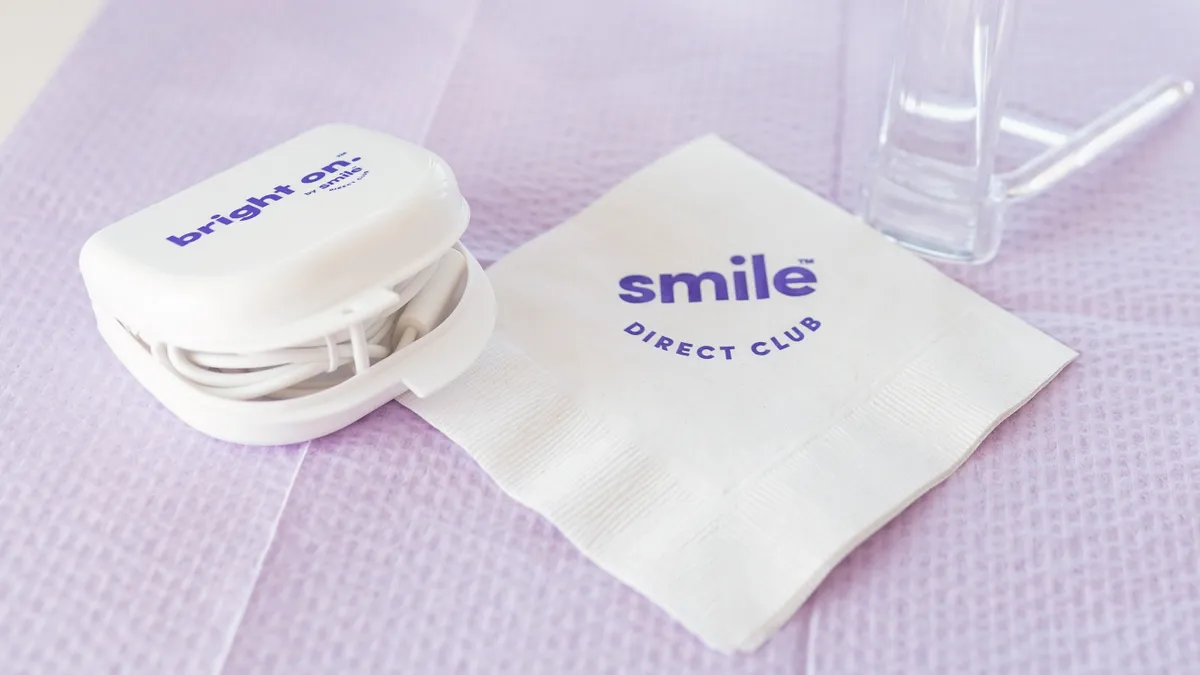Dive Brief:
- After not being able to obtain third-party financing, dental care company SmileDirectClub filed for Chapter 11 bankruptcy on Friday, according to a company press release.
- To support its restructuring, the direct-to-consumer company has agreed to a DIP facility in which its co-founders have committed to provide at least $20 million. Additional funding up to $60 million will be available to SmileDirectClub if it satisfies certain conditions, such as a net cash flow test.
- If the company does not receive interest in a going-concern transaction between now and Nov. 23, the DIP Facility will provide “for an orderly and expeditious liquidation of the business through a Chapter 11 plan,” per a court filing from CFO Troy Crawford with the U.S. Bankruptcy Court for the Southern District of Texas. SmileDirectClub had approximately $890.6 million of funded debt as of the petition date, with more than $1 billion in liabilities and over $500 million in assets.
Dive Insight:
Although it provides online services, SmileDirectClub didn’t exactly benefit from the COVID-19 pandemic e-commerce boom.
“Despite its telehealth care model, SmileDirect was not immune to the COVID-19 pandemic,” Crawford said in a court filing. “The Company’s operations during the pandemic were stifled due to, among other things, forced store closures, supply chain disruptions, and labor shortages, reducing the Company’s ability to timely fulfill orders and increasing its cost of doing business.”
The company is known for its teeth aligners. During the height of the COVID-19 pandemic, SmileDirectClub shifted its model away from SmileShop locations — of which it currently operates 110 across the U.S. — and toward doctor-prescribed impression kits shipped directly to customers. The SmileShops historically accounted for about 90% of the company’s sales, and the operational change resulted in decreased conversion rates.
Rising inflation and interest rates shifted consumer spending habits, which had an impact on the company given that its “sales have historically been driven by lower to middle income consumers” who are attracted to its lower pricing.
As the height of the pandemic subsided, the company’s revenue declined significantly, with a recorded decrease of 37.3% between 2019 and 2022.
“In response to decreasing sales, the continuing macroeconomic decline, and the inflationary environment, the Company undertook a holistic review of its business with the goal of right-sizing its entire operating structure, including its facilities and headquarter footprint, workforce, and other key cost spending,” Crawford added.
But those efforts were not successful enough to resolve its growing liquidity problems. The company’s liquidity was further challenged by disputes with Align Technology — the medical device company that makes Invisalign. SmileDirectClub alleges that Align “violated the restrictive covenants it had agreed to when it became a 19% investor in the Company and its exclusive third-party supplier,” though the latest arbitration between the companies resulted in a $63 million judgment entered against SmileDirectClub on Sept. 12.
Looking forward, SmileDirectClub CEO David Katzman remains positive.
“This transaction is designed to ensure our future financial structure reflects the talent of our team members and the quality of our business, and I am excited about the future ahead,” Katzman said in a statement. “I look forward to continuing to work alongside leadership and our talented team to transform smiles with the reliability and quality our customers deserve.”















